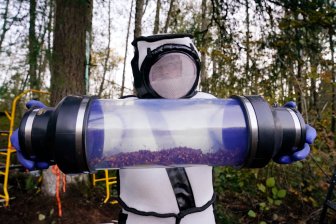Health
2,145 more coronavirus cases confirmed as Canadian total pushes past 215,000 – Global News

Canada added 2,145 confirmed cases of the novel coronavirus to its nationwide tally on Sunday, along with 24 more deaths.
So far, 215,884 people in Canada have tested positive for the virus, while the country’s death toll stands at 9,946. Since the pandemic began, 181,429 people have recovered after falling ill and more than 11.1 million tests have been administered.
Sunday’s numbers represent a partial update on the pandemic because B.C., Alberta, P.E.I. and the territories only provide new figures on weekdays.
Chief public health officer Dr. Theresa Tam said the latest national data showed Canada was averaging 2,488 newly confirmed cases and 74,719 tests conducted per day, Of those tested, she said 3.1 per cent resulted in a positive diagnosis.
“Outbreaks continue to contribute to COVID-19 spread in Canada,” Tam said in a statement.
“These vary in size from just a few cases to larger clusters occurring in a range of settings including long term care and assisted living facilities, schools, congregate living settings, industrial work settings and large social gatherings.”
In Quebec — the country’s viral epicentre — health officials reported 879 new cases of COVID-19, tipping the provincial total past 100,000.
They added 11 more people had died, moving the number of deaths in the province up to 6,143.
As of Sunday, 84,828 people residing in the province had recovered and more than 2.9 million COVID-19 tests had been administered.
[ Sign up for our Health IQ newsletter for the latest coronavirus updates ]
Ontario health officials detected 1,042 more infections of the virus, setting a new single-day record, and said seven more people had died.
Since the pandemic began, the province has confirmed 70,373 cases of COVID-19 and 3,093 deaths.
More than 4.9 million tests for the virus have been conducted while 60,160 people are in recovery.
In the wake of the province’s grim milestone, Ontario Health Minister Christine Elliott urged Canadians to follow public health guidelines and reduce the curve in a series of posts on Twitter.
“We all need to do our part to #StopTheSpread of #COVID19,” she tweeted.
Sixty more people were diagnosed with COVID-19 in Saskatchewan, bringing the province’s national number to 2,729. So far, 25 people in the province have died from the virus, 2,085 have recovered and 247,909 tests have been administered by provincial health authorities. Twenty five people are in hospital and 619 cases are active.
The number of active cases and hospitalizations are at their highest levels seen in the province.
Scott Moe, who is seeking reelection as premier this week, said during a campaign stop on Saturday that the spread of the coronavirus could be curbed without having to resort to shutdowns.
“We will not have to have an economy-wide shutdown. We understand the virus much better,” he said.

In Manitoba, health authorities said four more people had died and 161 new cases of COVID-19 were detected. Since the start of the pandemic, the province has reported 4,249 cases and 54 deaths.
By Sunday, 2,142 people had recovered after falling ill and officials conducted 240,639 tests.
Two more COVID-19-related deaths were recorded in New Brunswick on Sunday.
“I extend my deepest sympathies to the family and friends of the individuals, as well as to all of those in the Campbellton-Restigouche and Moncton regions,” chief medical officer of health Dr. Jennifer Russell said in a statement.
“Kindness and compassion, along with strict adherence to two-metre distancing, and mask use are how we will get through this together.”
The province also reported two new cases of COVID-19, for a total of 328 confirmed infections and six deaths. So far, 96,747 tests have been administered and 257 of the province’s confirmed cases are considered resolved.
Newfoundland and Labrador reported one more case of the virus on Sunday, bringing its total to 280. The case is tied to travel, officials said.
Among the provinces that provided updates on Saturday, Nova Scotia was the only one that did not see any new cases. The cumulative total stands at 1,110 infections, only six of which are currently active.
© 2020 Global News, a division of Corus Entertainment Inc.
Health
Interior Health delivers nearly 800K immunization doses in 2023
|
|
Interior Health says it delivered nearly 800,000 immunization doses last year — a number almost equal to the region’s population.
The released figure of 784,980 comes during National Immunization Awareness Week, which runs April 22-30.
The health care organization, which serves a large area of around 820,000, says it’s using the occasion to boost vaccine rates even though there may be post-pandemic vaccine fatigue.
“This is a very important initiative because it ensures that communicable diseases stay away from a region,” said Dr. Silvina Mema of Interior Health.
However, not all those doses were for COVID; the tally includes childhood immunizations plus immunizations for adults.
But IHA said immunizations are down from the height of the pandemic, when COVID vaccines were rolled out, though it seems to be on par with previous pre-pandemic years.
Interior Health says it’d like to see the overall immunization rate rise.
“Certainly there are some folks who have decided a vaccine is not for them. And they have their reasons,” said Jonathan Spence, manager of communicable disease prevention and control at Interior Health.
“I think there’s a lot of people who are hesitant, but that’s just simply because they have questions.
“And that’s actually part of what we’re celebrating this week is those public health nurses, those pharmacists, who can answer questions and answer questions with really good information around immunization.”
Mima echoed that sentiment.
“We take immunization very seriously. It’s a science-based program that has saved countless lives across the world and eliminated diseases that were before a threat and now we don’t see them anymore,” she said.
“So immunization is very important.”





Health
Remnants of bird flu virus found in pasteurized milk, FDA says


|
|
The U.S. Food and Drug Administration said Tuesday that samples of pasteurized milk had tested positive for remnants of the bird flu virus that has infected dairy cows.
The agency stressed that the material is inactivated and that the findings “do not represent actual virus that may be a risk to consumers.” Officials added that they’re continuing to study the issue.
“To date, we have seen nothing that would change our assessment that the commercial milk supply is safe,” the FDA said in a statement.
The announcement comes nearly a month after an avian influenza virus that has sickened millions of wild and commercial birds in recent years was detected in dairy cows in at least eight states. The Agriculture Department says 33 herds have been affected to date.
FDA officials didn’t indicate how many samples they tested or where they were obtained. The agency has been evaluating milk during processing and from grocery stores, officials said. Results of additional tests are expected in “the next few days to weeks.”
The PCR lab test the FDA used would have detected viral genetic material even after live virus was killed by pasteurization, or heat treatment, said Lee-Ann Jaykus, an emeritus food microbiologist and virologist at North Carolina State University
“There is no evidence to date that this is infectious virus and the FDA is following up on that,” Jaykus said.
Officials with the FDA and the USDA had previously said milk from affected cattle did not enter the commercial supply. Milk from sick animals is supposed to be diverted and destroyed. Federal regulations require milk that enters interstate commerce to be pasteurized.
Because the detection of the bird flu virus known as Type A H5N1 in dairy cattle is new and the situation is evolving, no studies on the effects of pasteurization on the virus have been completed, FDA officials said. But past research shows that pasteurization is “very likely” to inactivate heat-sensitive viruses like H5N1, the agency added.
Matt Herrick, a spokesman for the International Dairy Foods Association, said that time and temperature regulations for pasteurization ensure that the commercial U.S. milk supply is safe. Remnants of the virus “have zero impact on human health,” he wrote in an email.
Scientists confirmed the H5N1 virus in dairy cows in March after weeks of reports that cows in Texas were suffering from a mysterious malady. The cows were lethargic and saw a dramatic reduction in milk production. Although the H5N1 virus is lethal to commercial poultry, most infected cattle seem to recover within two weeks, experts said.
To date, two people in U.S. have been infected with bird flu. A Texas dairy worker who was in close contact with an infected cow recently developed a mild eye infection and has recovered. In 2022, a prison inmate in a work program caught it while killing infected birds at a Colorado poultry farm. His only symptom was fatigue, and he recovered.
___
The Associated Press Health and Science Department receives support from the Howard Hughes Medical Institute’s Science and Educational Media Group. The AP is solely responsible for all content.





Health
Canada Falling Short in Adult Vaccination Rates – VOCM


Canada is about where it should be when it comes to childhood vaccines, but for adult vaccinations it’s a different story.
Dr. Vivien Brown of Immunize Canada says the overall population should have rates of between 80 and 90 per cent for most vaccines, but that is not the case.
She says most children are in that range but not for adult vaccines and ultimately the most at-risk populations are not being reached.
She says the population is under immunized for conditions such as pneumonia, shingles, tetanus, and pertussis.
Brown wants people to talk with their family physician or pharmacist to see if they are up-to-date on vaccines, and to get caught up because many are “killer diseases.”
-



 Health9 hours ago
Health9 hours agoRemnants of bird flu virus found in pasteurized milk, FDA says
-
Art15 hours ago
Mayor's youth advisory council seeks submissions for art gala – SooToday
-



 Science23 hours ago
Science23 hours ago"Hi, It's Me": NASA's Voyager 1 Phones Home From 15 Billion Miles Away – NDTV
-



 Health13 hours ago
Health13 hours agoBird flu virus found in grocery milk as officials say supply still safe
-
News21 hours ago
Some Canadians will be digging out of 25+ cm of snow by Friday – The Weather Network
-
Media20 hours ago
Jon Stewart Slams the Media for Coverage of Trump Trial – The New York Times
-



 Investment14 hours ago
Investment14 hours agoTaxes should not wag the tail of the investment dog, but that’s what Trudeau wants
-
News14 hours ago
Peel police chief met Sri Lankan officer a court says ‘participated’ in torture – Global News





